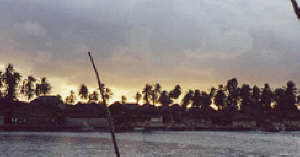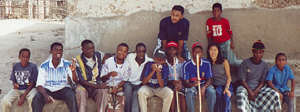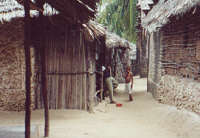The sun was rushing toward the horizon, streaking the sky with reds and oranges, and through the haze I saw the mud and stick houses of the villagers, the palm trees � and then a huge crowd gathered at the pier. It looked as if the entire village had come to watch the most exciting event of the day, our arrival. When they spotted me, the children began to shout in frenzy: “China! China! China!” I jumped off the boat, and suddenly they surrounded me, hundreds of children with inflated bellies staring at the first Asian face they had ever seen. Their shouts rose in volume and insistence and I wondered if I should lift my hands like the Pope and make a speech. The Super Stars opened their way through the throng and I followed them, the children trailing behind me.
|
In the tropics, the sun goes down in fifteen minutes, and by the time we reached the house where we would be living, it was pitch black. Kizingitini has no electricity, no running water, no toilets, no toilet paper, no forks, no spoons, no sandy beaches, and no tourists. I was one of the first foreigners to reach the island and probably the first to visit with the Super Stars, who were celebrities themselves and sent the local kids on errands. In a matter of minutes the island was abuzz with the news that a mzungu was among them.
|
Children came to our house with messages from their families: they wanted to see me. The women of the village opened their doors to me, all anxious to touch my hair and ask me where my husband was and let me hold their babies. That night I ate ugali and fish with the Super Stars around the light of a kerosene lamp, drank spicy chai and waited for the moon to rise. The children never left my side; everything I did was worthy of their attention. Rural Africans have no concept of personal space; they never grow tired of watching you.
The Super Stars insisted that I sleep in one of the villager’s houses; I would have my own bed and mosquito net instead of sleeping on the floor with all the players. I protested but finally gave in, not knowing if they were afraid of breaking a rule of Islam or just taking care of me as always. I spent all night getting bitten and wondering how many mosquitoes could have gotten inside the net. The next morning, I was sorry I had decided to set foot in that room; in the daylight I saw that there were bedbugs everywhere. I was itchy and miserable, but I didn’t dare take a bucket shower because I had seen tiny worms in the water.
|
![]()
It was a long weekend. When I wasn’t at the games, I wandered around the dusty streets. The women, like women all over Africa, were constantly gathering firewood and water, cooking, sweeping dirt floors and washing clothes. The men fished or sat under trees smoking as the women and girls walked by with enormous bundles balanced on their heads and babies tied to their backs with a kanga.
Kizingitini is much more sprawling and less charming than Lamu. It doesn’t have the white Swahili architecture or the tiny alleyways. It is a poor village of dark houses where children grow up eating fish and listening with disbelief to their parents’ stories of the outside world. Yet these families offered to share with me the little that they had – including a bed without bugs, once I explained the problem.
“Karibuni, karibuni!” they would welcome us when I passed by with some players. Once inside they would sit me down on a hand-woven chair and smile at me as if I completed the room. “Habari ya leo?” they’d ask, three generations under one roof drinking my face with their eyes.
“Mzuri sana. Hamjambo?” I exchanged pleasantries and they would laugh delightedly and tell me to stay with them for a week. I was the number one curiosity in the village and everyone wanted to get me into their houses. “Mchina,” my children followers would remind each other every now and then. How, I wondered, did they know what a Chinese person looked like if they had never seen a television? Every scorching day and inky night I walked through the maze of houses with the growing conviction that if I had come there alone, these people whose names I never remembered would have given me everything I needed.
Coming back to Lamu from Kizingitini I breathed a sigh of relief; the waterfront looked like a metropolis. Once again I would have cold Fantas, running water, and decent toilets. I was back to the place where my days were infused with exaggerated colors and sensations. I got off the boat and savored the streets, smiling at the familiar faces of children and shopkeepers, stopping to greet friends on my way home.
“Mwalimu!” they called. “Habari ya safari? Umesharudi?” How was the trip? You’re back already?
“Of course. Lamu paradise.”


